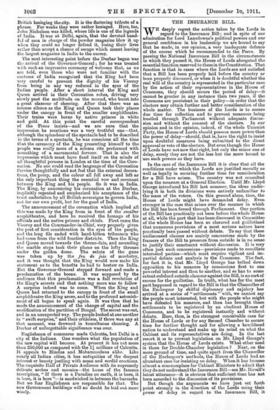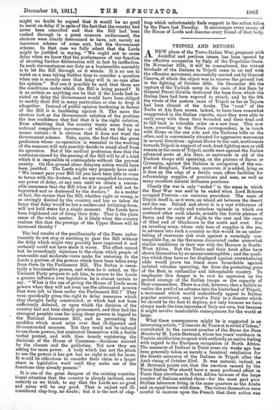THE INSURANCE BILL.
WE deeply regret the action taken by the Lords in regard. to the Insurance Bill ; and in spite of our admiration for Lord Lansdosvne's political powers and our general confidence in his leadership we are bound to say that he made, in our opinion, a very inadequate defence of the course which he recommended to the Peers. By passing the National Insurance Bill in the circumstances in which they passed it, the House of Lords abrogated the essential function reserved to them in the Constitution. That function is that in cases where the Lords are not satisfied that a Bill has been properly laid before the country or been properly discussed, or when it is doubtful whether the real will of the country is represented in the particular case by the action of their representatives in the House of Commons, they should secure the period of delay—it cannot be greater in any instance than two years, if the Commons are persistent in their policy—in order that the electors may obtain further and better consideration of the whole matter. The business of the Lords is to secure due time for reflection and to prevent measures being hustled through Parliament without adequate discus- sion and without the consent of the electors. In our opinion and in the opinion, indeed, of the whole Unionist Party, the House of Lords should possess more power than the power of delay—should, that is, have the right to insist upon doubtful measures being submitted to the direct approval or veto of the electors. But even though the House of Lords have not now that right, but only the minor one of delay, surely they are not the less but the more bound to use such powers as they have.
In the case of the Insurance Bill it is clear that all the conditions under which the Lords are justified morally as well as legally in securing further time for consideration for a Bill have arisen. The country was not consulted upon the measure at a General Election. Until Mr. Lloyd George introduced his Bill last summer, the ideas under- lying it in both its divisions were entirely unfamiliar to the mass of the voters. On this ground alone, then, the House of Lords might have demanded delay. Even stronger is the case that arises over the manner in which the Bill has been forced through Parliament. One portion of the Bill has practically not been before the whole House at all, while the part that has been discussed in Committee of the whole House has been so closured and guillotined that numerous provisions of a most serious nature have practically been passed without debate. To say that these undiscussed clauses are mainly concessions made by the framers of the Bill to pressure from outside is in no sense to justify their enactment without discussion. It is very often just such concessions—provisions made to conciliate interested parties—which most require vigilant and im- partial debate and analysis in the Commons. The fact, for fact it is, that Mr. Lloyd George has bribed down opposition to his measure by concessions first to one powerful interest and then to another, and so has to some extent subdued outside clamour against the Bill, is no sort of excuse for the guillotine. In truth, what has for the most part happened in regard to the Bill is that the Chancellor of the Exchequer by skilful diplomacy and cajolery has arrived at a series of " settlements " with, we cannot say the people most interested, but with the people who might have defeated his measure, and then has brought those settlements to be registered by an obedient House of Commons, and to be registered instantly and without debate. Here, then, is the strongest conceivable case for the House of Lords or for any Second Chamber to secure time for further thought and for allowing a bewildered nation to understand and make up its mind on -what the Cabinet and its representatives are doing. In the last resort it is to prevent legislation on Mr. Lloyd George's system that the House of Lords exists. What other need is there for Double-Chamber legislation ? Next, on the mere ground of time, and quite apart from the Chancellor of the Exchequer's methods, the House of Lords had an abundant case for insisting on delay. When it has become almost a commonplace for Cabinet Ministers to admit that they do not understand the Insurance Bill—see Mr. Bissell's latest utterance—it is obvious that sufficient time has not been accorded to the discussion of its provisions. But though the arguments we have just set forth point strongly in the direction of the Lords using theii power of delay in regard to the Insurance Bill, it might no doubt be argued that it would be no good to insist on delay if in spite of the fact that the country had never been consulted and that the Bill had been rushed through in a great measure undiscussed, the electors were clearly determined to have, not merely an insurance scheme of some sort, but the Government scheme. In that case we fully admit that the Lords might be justified in saying, "We ought not to cause delay when we know that the performance of our function of securing further deliberation will in fact be ineffective. In such circumstances our duty as a businesslike assembly is to let the Bill through as it stands. It is no use to insist on a man taking further time to consider a question when one is morally sure that delay will in no case alter his opinion." But can it possibly be said that these are the conditions under which the Bill is being passed ? It is as certain as anything can be that if the Lords had in- sisted on delay the Government would have been obliged to modify their Bill in many particulars or else to drop it altogether. Instead of public opinion hardening in favour of the Bill it is hardening against it. The more the electors look at the Government solution of the problem the less confidence they feel that it is the right solution. Even admitting that the country wants some form of national compulsory insurance—of which we feel by no means certain—it is obvious that it does not want the Government scheme. Take, again, the fact that the great profession whose co-operation is essential to the working of the measure will very possibly decide to stand aloof from its operation. But if the medical profession does this the confusion caused by the passing of the Bill will he of a kind which it is impossible to contemplate without the gravest anxiety. On this ground alone delaying action would have been justified. The Lords might very properly have said : "We cannot pass your Bill till you have been able to come to terms with the doctors, and we are compelled to exercise our power of delay, at any rate until we obtain a reason- able assurance that the Bill when it is passed will not be boycotted and so destroyed by the doctors." As a matter of fact, the excuse that the Bill, whether right or wrong, is so strongly desired by the country, and has so taken its fancy that delay would be but a useless and irritating form, will not hold water for a single moment. The Lords have been frightened out of doing their duty. That is the plain sense of the whole matter. Is it likely when the country realizes this that the prestige of the -Upper House will be increased thereby ?
The bad results of the pusillanimity of the Peers unfor- tunately do not stop at assisting to pass the Bill without the delay which might very possibly have improved it and certainly could not have made it worse. The effect cannot but be exceedingly injurious to the claim which people of reasonable and moderate views make for restoring to the Lords a portion of the powers which have been taken away from them by the Parliament Bill. The Briton is essen- tially a businesslike person, and when he is asked, as the Unionist Party propose to ask him, to secure to the Lords a greater influence over legislation he is almost certain to say : "What is the use of giving the House of Lords more powers when they will not even use the attenuated powers that were left to them under the Parliament Bill ? They were specifically given the right to delay measures which they thought badly constructed, or which had not been sufficiently debated, or upon which the decision of the country had not been clearly pronounced, and they had the strongest possible case for using those powers in regard to the National Insurance Bill, and so preventing the muddles which must arise over that ill-digested and ill-constructed measure. Yet they could not be induced to use those powers, but contented themselves with a feeble verbal protest, and with then tamely registering the decisions of the House of Commons—decisions secured by the closure and the guillotine. Yet now they are asking for more power. A body which has not the pluck to use the powers it has got has no right to ask for more. It would be ridiculous to consider their claim to a larger share in legislative work until they make use of the functions they already possess."
It is one of the great dangers of the existing constitu- tional situation that the country is already inclined, most unfairly as we think, to say that the Lords are no good mad never will be any good. That is unjust and ill- considered clap-trap, no doubt ; but it is the sort of clap- trap which unfortunately finds support in the action taken by the Peers last Tuesday. It encourages every enemy of the House of Lords and disarms every friend of that body.



















































 Previous page
Previous page